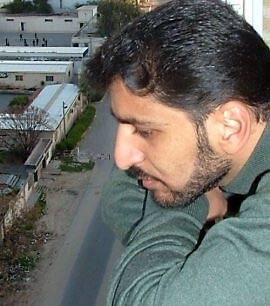Gaza Strip 11 April 2005

Majdi Da’na, 28, from Bethlehem, stands at the window staring at the Gaza Sea. (Photo: Sami Abu Salem)
Some of them sat on a sofa, others on chairs and the ground, the ringing of mobile phones does not stop. As one of them speaks via mobile, the others stare at him, waiting for new information.
“I have not slept for four days. I am thinking of returning home and hugging my mother. I have not seen her for three years,” said Issa Abu Ahoor, 39, from Bethlehem, while he was browsing news webs. “We spend most of our time just in following the news via papers, TV, radio, and the Internet”.
Abu Ahoor stressed the guarantees to assure the safety of all the deportees. “We completely trust the leadership and President Mahmoud Abbas, and believe in his efforts. But honestly, we do not trust the Israelis, if we have the opportunity to return, I do not know if I will decide to return or not,” he added.
“I hope the President will succeed in achieving peace and stability. I hope that we and the Israelis can live in calmness and peace. I wish to live with my family, my sweet daughter (Mira, 2) in quietness and safety” he said, while rubbing his daughter’s hair.
He said that expelling him from Bethlehem caused a lot of psychological and material loss. “The most important loss is my 70-year-old mother. She suffers from diabetes and blood pressure, I can’t see her. Why do the Israelis prevent her from visiting me?”.
Abu Ahoor lost his work as a construction contractor. His wife, who has an MA in Nursing, lost her job as a nurse in Jerusalem after following her husband to Gaza.
It was the birthday of Nader Abdulaziz, 29, from Bethlehem, who arrived with a knock on the door together with his two children Issam, 3, and Mohammed, 5.
His comrades congratulated him on his birthday. “My real birthday is my return home in safety,” he replied.
Abdulaziz sat on the sofa with his two children around him. Asked about the first thing he will do in the event of his return, he said, “First of all, I will look for security and safety for my children and my family,” adding that he fears Israeli settlers more than the Israeli Occupation Forces (IOF).
“I live close to the colony of Gilo. My window faces the colony. How could I believe that those colonizers would not attack or open fire? And how could I believe that the IOF would not assassinate, or arrest me?”
Abdulaziz, a hotel decorator, will try to move to a new house in a “safer area” on his return and look for a new job. “I hope to return home and live with my children in security and stability. We are fed up with violence and would like to live the life we deserve, like others, full of humanity and safety,” he said. “I also hope to find opportunity for a good job to pave the way for a good future for my children”.
Twenty-six of Palestinians who took refuge in the Church of the Nativity were expelled to Gaza and 13 were expelled abroad in May 2002. Since their expulsion from Bethlehem, the comrades have been keeping touch with each other.
In a phone call with Jihad Ji’ara, deported to Ireland, he said that he and the other 12 expelled abroad were very pleased to hear about the possibility of their return. “All of us were so happy, we prefer to live on any area of our homeland rather than the paradise of any other country,” he said.
Ji’ara said that the first thing he will do in case of return is to hold and kiss his son, whom he has never seen. “My son Samed, I have never seen him — only in pictures. He was born on the day of my arrival into Ireland. I miss him so much.”
Ji’ara hoped the countries that participated in the process of deporting and hosting the deportees in Europe should have a role in guaranteeing the safety of their return.
Majdi Da’na, 28, from Bethlehem, was standing at the window staring at Gaza Sea. It was obvious that hesitation put him in “hard times” several days ago. “As soon as the media outlets began talking about our return, we found ourselves in a very hard psychological situation. I neither sleep nor eat. News is my breakfast, lunch, and supper,” he said.
Da’na studies business administration at Al-Quds Open University in Gaza, and says that he cannot decide whether to return or not. “When I think of returning home, my heart leaps up out of happiness. I miss my family, especially my sisters and my mother. But, in fact, I am very worried”.
He said: “Even my mother, when I phone her, advises me not to return as long as there are no guarantees”.
Da’na said that when he was expelled from the Church of the Nativity, he was engaged and about to get married. He dreams of getting married in the event of his “safe return and life”.
“If I get past my indecision, the first thing I will do on my return is visit the graves of my friends who were slaughtered by the Israeli Occupation Forces (IOF). Regarding my projects, I will further my study, find a good job and make a family.”
Related Links





